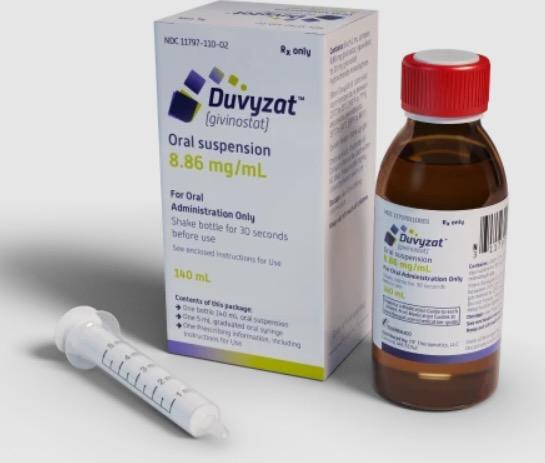Givinostat Dosage
Medically reviewed by Drugs.com. Last updated on Aug 13, 2024.
Applies to the following strengths: 8.86 mg/mL
Usual Adult Dose for:
Usual Pediatric Dose for:
Additional dosage information:
Usual Adult Dose for Muscular Dystrophy
- Weight 10 to less than 20 kg: 22.2 mg orally twice a day
- Weight 20 to less than 40 kg: 31 mg orally twice a day
- Weight 40 to less than 60 kg: 44.3 mg orally twice a day
- Weight 60 kg or more: 53.2 mg orally twice a day
Comments:
- The drug is not recommended for patients with a platelet count below 150 x 10(9)/L.
- ECGs should be obtained before starting treatment in patients with underlying cardiac disease or those taking concurrent drugs that prolong QT.
Use: For the treatment of Duchenne muscular dystrophy
Usual Pediatric Dose for Muscular Dystrophy
6 TO LESS THAN 18 YEARS:
- Weight 10 to less than 20 kg: 22.2 mg orally twice a day
- Weight 20 to less than 40 kg: 31 mg orally twice a day
- Weight 40 to less than 60 kg: 44.3 mg orally twice a day
- Weight 60 kg or more: 53.2 mg orally twice a day
Comments:
- The drug is not recommended for patients with a platelet count below 150 x 10(9)/L.
- ECGs should be obtained before starting treatment in patients with underlying cardiac disease or those taking concurrent drugs that prolong QT.
Use: For the treatment of Duchenne muscular dystrophy
Renal Dose Adjustments
No adjustment recommended
Liver Dose Adjustments
Dose adjustment may be required; however, no specific guidelines have been suggested.
Dose Adjustments
Dosage Modifications for Adverse Reactions:
- Platelet count below 150 x 10(9)/L (in 2 assessments one week apart) or
- Moderate or severe diarrhea or
- Fasting triglycerides more than 300 mg/dL (in 2 assessments one week apart)
- Weight 10 kg to less than 20 kg:
- First Dosage Modification: 17.7 mg orally twice a day
- Second Dosage Modification: 13.3 mg orally twice a day
- Weight 20 kg to less than 40 kg:
- First Dosage Modification: 22.2 mg orally twice a day
- Second Dosage Modification: 17.7 mg orally twice a day
- Weight 40 kg to less than 60 kg:
- First Dosage Modification: 31 mg orally twice a day
- Second Dosage Modification: 26.6 mg orally twice a day
- Weight 60 kg or more:
- First Dosage Modification: 39.9 mg orally twice a day
- Second Dosage Modification: 35.4 mg orally twice a day
- Based on the severity of adverse reactions, treatment interruption before dosage modification should be considered.
- If the adverse reaction(s) persist after the first dosage modification, proceed to the second dosage modification.
- Discontinue drug if the adverse reaction(s) persist after the second dosage modification.
QTc Interval Prolongation:
- Withhold the treatment with this drug if the QTc interval is more than 500 ms or the change from baseline is more than 60 ms.
Precautions
CONTRAINDICATIONS: None
Safety and efficacy have not been established in patients younger than 6 years.
Consult WARNINGS section for additional precautions.
Dialysis
Data not available
Other Comments
Administration advice:
- Obtain and evaluate baseline platelet counts and triglycerides before initiating this drug.
- Before use, shake the suspension for at least 30 seconds by inverting the bottle by 180° until a homogeneous suspension is formed.
- Administer the appropriate volume orally with the provided oral syringe.
- Administer with food.
- If a dose is missed, patients should not take double or extra doses.
Storage requirements:
- Store upright at 20 C to 25 C (68 F to 77 F). Excursions permitted to 15 C to 30 C (59 F to 86 F).
- Do not freeze.
- Discard unused drug after 60 days of first opening the bottle.
Monitoring:
- Cardiovascular: ECG at treatment initiation and as clinically indicated in patients with underlying cardiac disease or taking concomitant medications that cause QT prolongation
- Hematologic: Platelet counts, triglycerides
Patient advice:
- Read the US FDA-approved patient labeling (Medication Guide and Instructions for Use).
- Notify your healthcare provider if you have easy bruising, excessive bleeding from cuts, blood in the stool or fatigue.
- Patients should adhere to the testing recommended to monitor hematological and triglyceride levels.
- This drug can cause diarrhea and vomiting. Patients should maintain hydration if diarrhea or vomiting occurs. Contact healthcare provider if the symptoms persist or become moderate to severe.
- This drug can prolong the QTc interval. Patients should inform their healthcare provider if they have or develop any symptoms of significant QTc prolongation or new cardiac issues (such as dizziness, lightheadedness, syncope) and before taking any over-the-counter, herbal, or prescription medications.
More about givinostat
- Check interactions
- Compare alternatives
- Side effects
- During pregnancy
- Drug class: miscellaneous uncategorized agents
- Breastfeeding
- En español
Patient resources
Other brands
Professional resources
Other brands
Related treatment guides
See also:
Further information
Always consult your healthcare provider to ensure the information displayed on this page applies to your personal circumstances.


